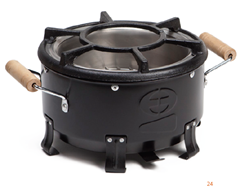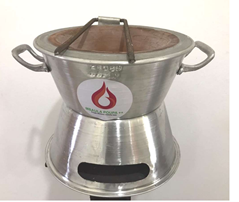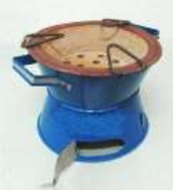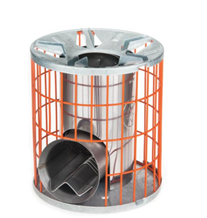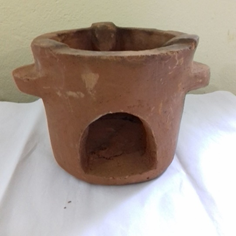Click here to register!
Pt/Carbonsink Moçambique Lda
Company Outline
Carbonsink a spinoff of the University of Florence-Italy founded in 2011 and is a consultancy company specialized in carbon neutral strategies for businesses and NGOs. It was a pioneer in Italy regarding carbon credits project development and is now an established market player both in Italy and internationally. From January 2022, CarbonSink joined South Pole, an international leading company in carbon projects.
Carbonsink develops Agroforestry and Climate-Smart Agriculture, Water Access; Forest Management and REDD+ and Energy Efficient Cookstoves projects to reduce emissions thus generating carbon credits. It has been working in Mozambique since 2014 developing and managing climate mitigation activities in several areas of the country. In 2018, Carbonsink opened a new Maputo based company: Carbonsink Moçambique Lda, as a subsidiary company of Carbonsink Group S.r.l. Italy.
- Areas of operation: Ongoing ICS projects in Cabo Delgado Province (Pemba city, Balama and Montepuez districts) and in Maputo Province as well as Maputo City
- Company Size: 5 staffs
- Countries of Operation: Mozambique, Ethiopia, Burundi and Uganda
- Financing: Our projects are developed with the financial support of donors in the form of grants and carbon finance. Since carbon credits are the final product generated by our projects, the revenue from the sale of the credits is reinvested for the implementation of new projects in the communities.
Carbonsink works with a trusted network of partners who have both on-site expertise and the trust of local communities. Recently, Carbonsink introduced a digital registration system compatible with android devices. The application developed for Carbonsink records all the stages of project implementation from distribution, and monitoring. Our distribution network for improved stoves starts at the production stage for locally produced stoves. Once the production has been completed and the product has been properly catalogued, it is transported to the central warehouse. From the central warehouse it is distributed to the field warehouses managed by a database manager, where sales promoters have access and stoves are assigned to each of them. With the system introduced, it is possible to track the stove from the factory to the end-user.
Sales promoters are young men and women who are trained in sales, product promotion and registration of beneficiary data in the application.
The stoves are sold door-by-door.
Consumer Insights
Our projects target low-income families who use charcoal and/or firewood as cooking fuel and whose living condition needs to be improved either in rural or urban areas. The characteristic of these households is that most are headed by women and/or elderly people, have one or two meals at most per day, and are severely affected by the impacts of climate change.
End-user Financing
The stoves distributed by Carbonsink use different payment modalities according to the facilities and depending on the realities of the place of implementation and the type of project and project financing:
- Pay-as-you-go.
- Payment in 2 instalments.
- Free of charge supported by the project
O&M and After Sales Service (Guarantee, Repair, Replacement....)
Some products come with instructions for use. Carbonsink in collaboration with the project partners conduct regular campaigns and awareness campaigns are held with end consumers on the use and handling of products to ensure that the stove's useful life is extended.
The products distributed by Carbonsink have a warranty period respecting the producer's policies. Envirofit and Zama Zama Rocket have a 2-year warranty and the locally produced Mbaulas A and B stoves and the Poupa-lenha have a 3-month warranty.
Carbonsink does not repair the stoves but provide spare parts that come within the lot for families who need to make a replacement as is the case with Envirofit and Zama Zama Rockets. For locally produced stoves, within the warranty period, are subject to replacement. In this case the return is made only when there is a manufacturing defect. The stove user contacts the promoter who made the sale or a person in charge of the project. The replacement is made within 3 days from the date of reporting the defect. The project has a contingency plan to cover the risks of stoves that may have a defect. In any case, to minimize damage, the stoves are checked one by one upon delivery from the producer to the central warehouse.
Impacts on End-users
In addition to reducing Greenhouse Gas (GHG) emissions and contributing to the mitigation of climate change, our projects as per today provided the following local benefits:
- Around 60.000 families consisting of at least five members were helped.
- Saving up to more than 70% in charcoal and firewood consumption for cooking.
- Up to (US) $190 yearly of savings for local families in charcoal needed for cooking.
- Reduced adverse health effects associated with smoke inhalation.
- Around 200.000 tons emission of CO2-eq/year reduced.
Constraints and Recommendations
One of the major constraints faced is the price of the product, which can be expensive to be purchased by our target group. It would not be practical to distribute energy efficient technologies without funding for our projects because the market cost of our products is high. Subsidized prices have been an advantage that have enabled the massive dissemination of stoves. The same ones that once cost 800 Mts today we sell at 500 Mts. For example, we sold 16 000 Mbaula A stoves in 2 years.
Another challenge is related to the displacement of the warehouse promoters from the countryside to the families. The distances are long and with the weight of the product, it is difficult to make an effective delivery of the product to interested users. The acquisition of a new txopela makes the delivery of stoves to families more flexible and the strategic location of field warehouses is allowing the distances traveled by promoters to be reduced.
COVID-19 also reduced the purchasing power of the families and made roadshows impossible, which is one of the marketing tools that works very well for the dissemination of this type of product. As a solution, we then chose to promote the products using radio broadcast.
Product Profile
We are a consulting company that works on the certification of carbon projects and carbon credits are our final product. We generate carbon credits by implementing improved cookstoves projects that contribute towards emissions reduction and climate change mitigation. The types of stoves disseminated so far by our projects are:

